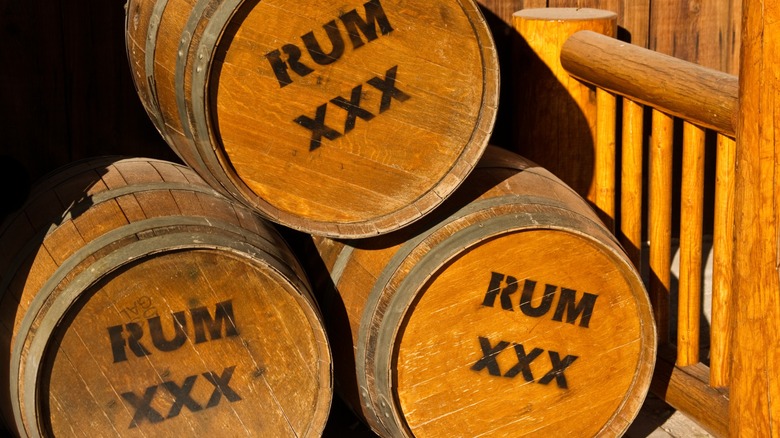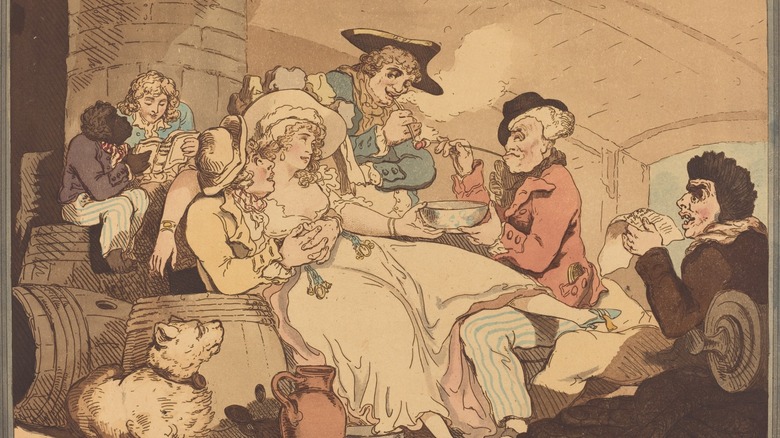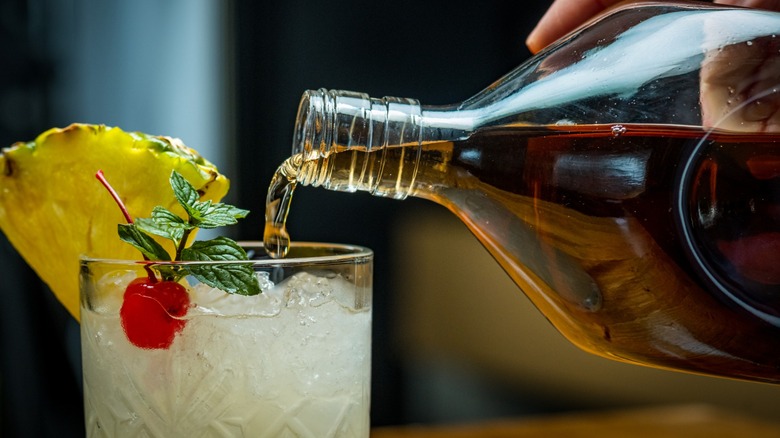Why People Once Tested Liquor With Gunpowder
The history of alcohol is full of fascinating characters and legends that have achieved pseudo-mythological status. From the ancient origins of beer in Mesopotamia to the longstanding myth surrounding absinthe that's still perpetuated to this day, it seems that wherever you dig into the world of drinks, you don't have to look very far before encountering an intriguing story. One such tale involves British sailors and their apparent fondness for pyrotechnics.
For centuries, the British Royal Navy included liquor as part of its sailors' rations (the practice stopped in 1970). As the story goes, the seafarers, wanting to make sure they were getting an honest supply of liquor to offset the frankly grim conditions of life at sea, took to mixing a tiny bit of gunpowder with liquor and trying to ignite it to determine whether their "tot" of alcohol was up to snuff. If the powder didn't ignite, then the ration was too watered down. However, if it reacted, then they had "proof" that their alcohol hadn't been cut with too much water. (This is how proof came to be the measurement for alcohol content.)
You might assume these seamen were imbibing rum, a spirit replete with legend and lore. The Caribbean sugar-based spirit dates back to the 17th century and has become near-synonymous in the cultural canon with the golden age of piracy and sailing (and rum-ragged sailors). But, like many tales from the high seas, there's some gray area surrounding the history of rum, sailors, and gunpowder.
The legend of gunpowder rum
There's an issue when it comes to sussing out the truth behind the practice of "proofing" alcohol with gunpowder, especially concerning rum, the booze most commonly associated with this tale. In fact, it's such a popular belief that the contemporary Pusser's Rum company offers a "gunpowder proof" rum inspired by the fabled test. Unfortunately, history may not corroborate the tales of British sailors lighting their rum ablaze before swilling it down.
The idea of testing alcohol content with gunpowder does indeed seem to have been an actual practice when higher-taxed "proof spirits" first came onto the scene, but this was only before the invention of the hydrometer, a tool that measures alcohol content more accurately than volatile gunpowder. At the time of the hydrometer's inception around 1730, the British Royal Navy hadn't yet considered rum their liquor of choice, instead usually flitting between brandy and arak (a pale, strong liquor from the Middle East).
By the time the spirit became a staple aboard naval vessels around the early 1800s, not only was the hydrometer present aboard ships but its efficacy was being improved. The much more refined Sikes hydrometer was officially accepted by the British parliament in 1816, further invalidating the rum-gunpowder test. Still, whether due to the alluring image or the somewhat romanticized view of that historical era, the idea of gunpowder proof rum lives on to this day.
The echoes of the era still sound
To this day, rum measured at 54.5% alcohol by volume (ABV) is considered "gunpowder proof" or "navy strength" rum, likely due to this sadly apocryphal story. However, you should still toss a helping of this strong spirit into your next hurricane cocktail or historically faithful and boozy Philadelphia punch. And besides, even if the story of the gunpowder test is a tad overblown, there are plenty of other remnants of that time period that survive in modern-day drinking culture.
If you've ever come across a boozy drink called "grog," then you've already been initiated into the maritime liquor lingo of that period. The term supposedly originated from a mid-18th-century British admiral named Sir Edmond Vernon, dubbed "Old Grog" for his characteristic grogram coat. Vernon watered down his ship's liquor supply in a well-meaning attempt to sober up his crew. This weaker offering was dubbed "grog" by the slighted sailors — likely a cutting reference to their admiral.
This is also where the term "groggy" seems to have originated, since drinking too much grog (or any other liquor, for that matter) can leave you feeling just a touch disoriented and off kilter. So, luckily for you, you need only to mix a simple drink to partake in pirate-age practices — no need to risk an explosion in your glass.


